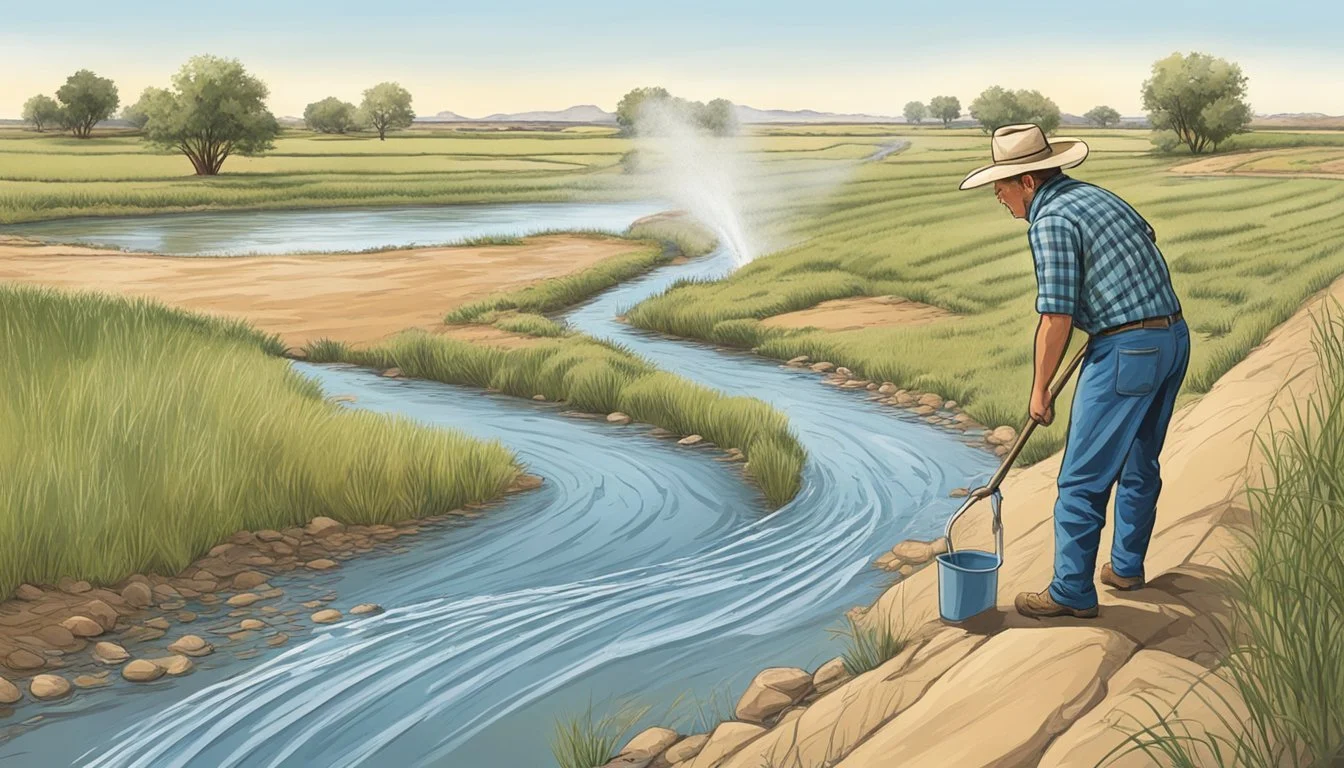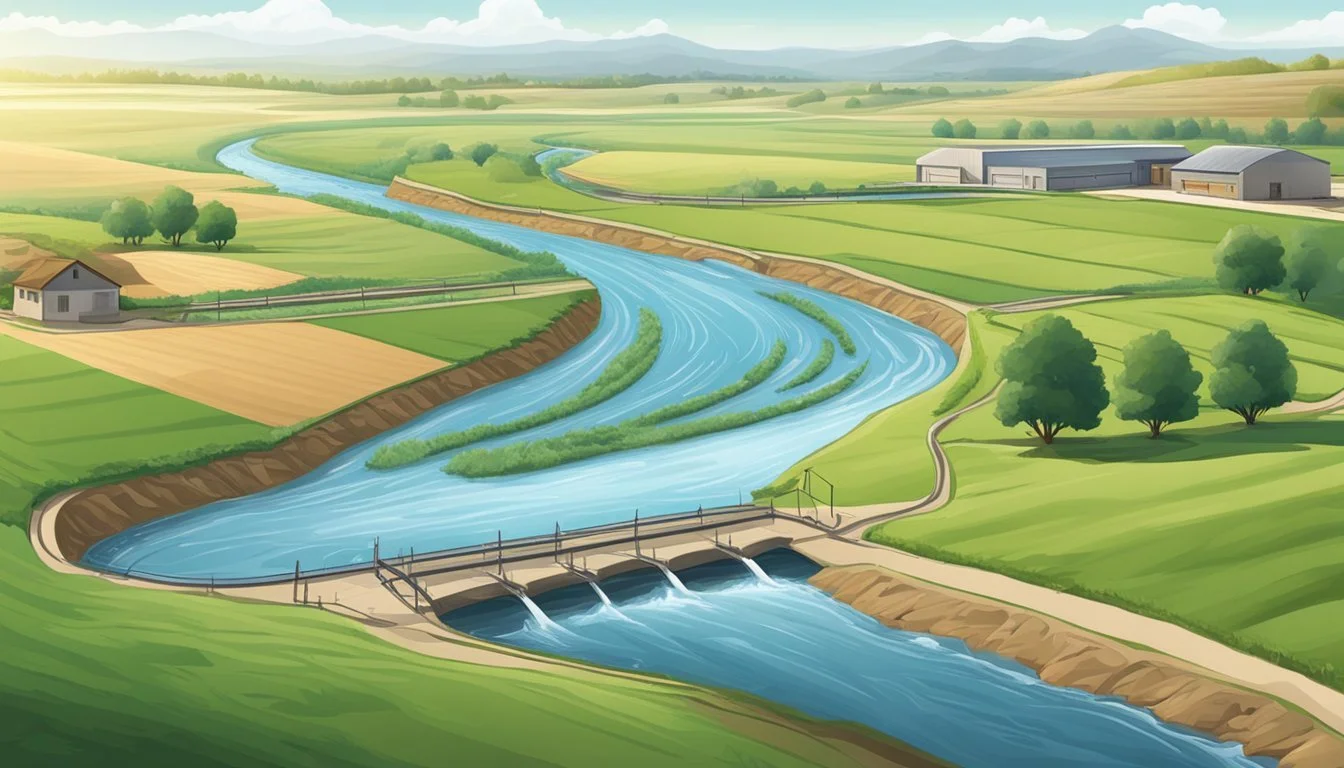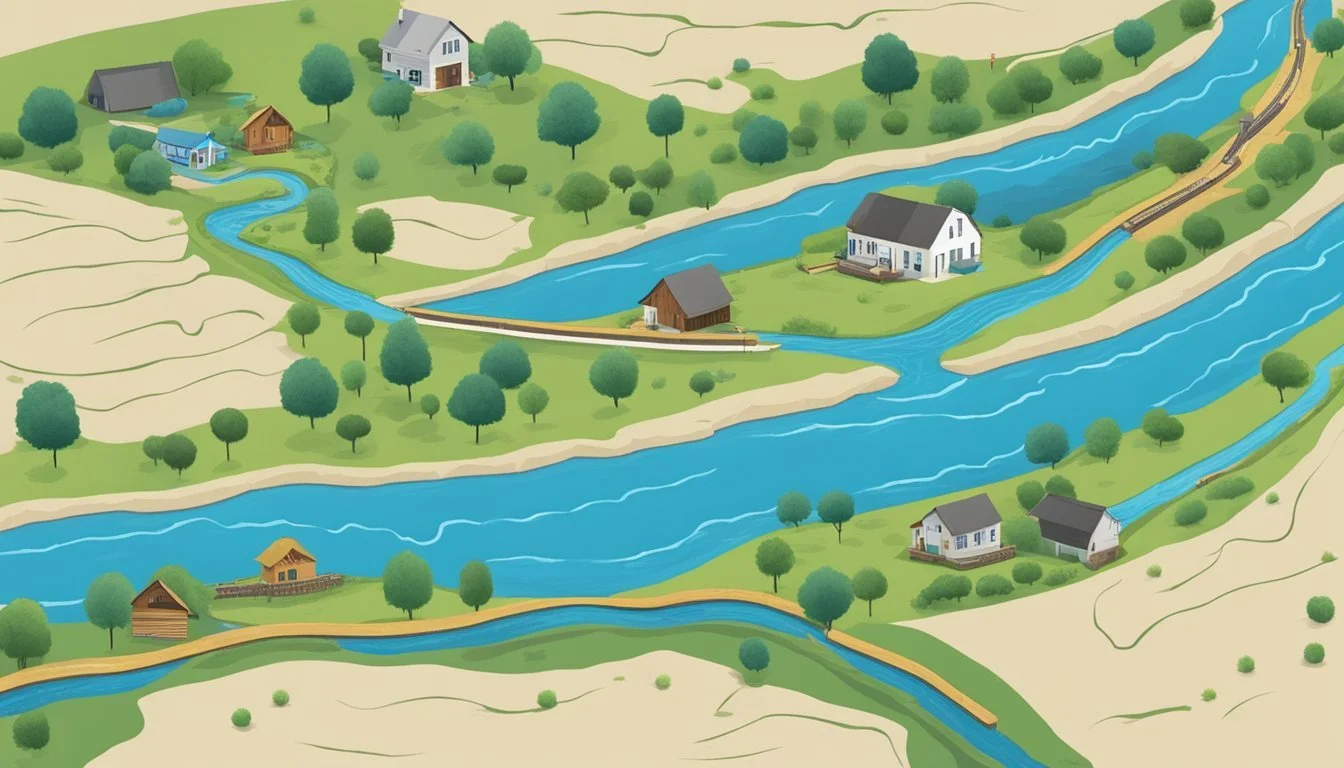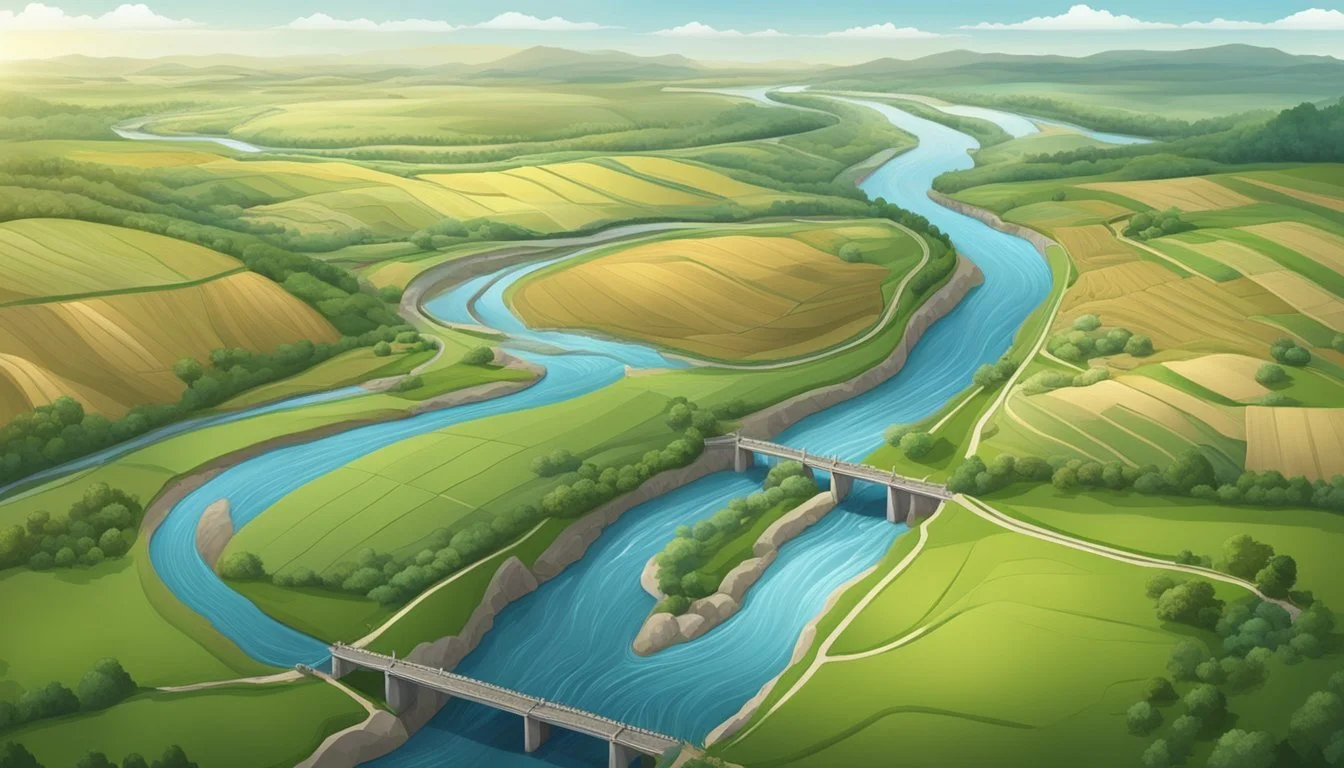Water Rights in Nebraska
Understanding State Policies and Stakeholder Impacts
Water rights are an essential aspect of Nebraska's legal and environmental landscape, holding significant importance for individual landowners, agricultural enterprises, and the state economy. In Nebraska, managing surface water resources is a responsibility that typically necessitates acquiring a surface water right or permit. These permits are crucial for those intending to utilize surface water, as they outline the specific location, amount of water, and purpose of use.
The administration of water rights is handled by the Nebraska Department of Natural Resources (NDNR). In Nebraska, water rights are legally attached to a parcel of land, asserting that the rights are transferred along with the property to new owners. This system ensures that water rights are maintained throughout changes in land ownership and that users stay informed of their rights and responsibilities.
Due to the intricate nature of water rights in Nebraska, it is imperative for landowners to comprehend their rights and the processes involved. This includes the registration of water wells with NDNR and obtaining the relevant permits before drilling. Maintaining an updated and accurate understanding of these regulations is key to preserving the state's water resources and adhering to the legal framework governing water usage.
Nebraska Water Rights Overview
Water rights in Nebraska are derived from a combination of doctrines and statutes that collectively govern the allocation and legal use of water resources within the state. They reflect a blend of English Common Law and the characteristics of a semi-arid environment, shaping a system that balances public welfare with private rights.
Historical Background
Nebraska's water rights have evolved over time, heavily influenced by both the English Common Law's riparian rights system and the western United States' doctrine of prior appropriation. The state has transitioned from a purely riparian rights system, which is based on land ownership adjacent to water sources, to a framework that incorporates aspects of both riparian and appropriative rights.
In 1957, legislation mandated the registration of all irrigation wells, marking a significant step in the state's water policy development. This action foreshadowed greater regulation and monitoring of water resources.
Understanding Water Law
Water law in Nebraska is a complex field, reflecting the state's involvement in managing water resources. It encompasses elements such as the first-in-time, first-in-right rule of prior appropriation, which grants water usage rights based on the seniority of claims. Unlike riparian rights, water rights are often detached from the land and can be sold or leased separately.
Correlative rights, a concept adapted from riparian doctrine, is also applied to groundwater management, allowing landowners reasonable and beneficial use of groundwater, conditional on not harming neighboring landowners.
Types of Water Rights
There are two primary types of water rights in Nebraska: surface water rights and groundwater rights.
Surface Water Rights: Governed by the principles of prior appropriation, these rights are attached to parcels of land or specific locations within the state and are transferred with the land ownership. The Nebraska Department of Natural Resources oversees the allocation and administration of these rights.
Groundwater Rights: Subject to correlative rights, groundwater usage necessitates a permit from local Natural Resources Districts before drilling. Registration with the Nebraska Department of Natural Resources is required upon completion of a well.
The interplay between these rights shapes how Nebraska's water resources are allocated and used, underpinning Nebraska's commitment to managing water resources sustainably.
Surface Water Allocation
In Nebraska, the distribution of surface water is a meticulously regulated process, ensuring equitable and sustainable use for its citizens. The Nebraska Department of Natural Resources oversees this through a structured permits system and strict regulations.
Surface Water Rights
Surface water rights in Nebraska are distributed based on the doctrine of prior appropriation, commonly summarized as "first in time, first in right." Persons wishing to make use of the state's surface water are typically mandated to obtain a water right or permit, which specifies the quantity, location, and purpose of the water use. These rights are assigned with the priority date playing a key role in times of scarcity.
Permits and Regulations
The Nebraska Department of Natural Resources (NeDNR) is responsible for issuing water permits, a mandatory requirement for those who intend to divert surface water for any use. The state scrutinizes applications to ensure that water allocation aligns with existing water administration practices and does not harm the ecological balance. Permits detail specific conditions including the amount of water, the point of diversion, and the purpose. The regulations safeguard the surface water resources, such as rivers, lakes, and streams, ensuring that rain and runoff are optimally distributed.
Surface Water Resources Management
Management of the state's surface water resources is a dynamic process, involving continuous monitoring and adjustments to water rights and uses in response to environmental and climatic changes. The Nebraska Department of Natural Resources takes the lead in balancing the needs of agriculture, municipalities, and ecosystem conservation. They employ both regular assessments of water sources and enforce regulations to secure long-term availability and quality of surface water for the diverse demands across Nebraska's unique geographical features.
Groundwater Management
In Nebraska, the management of groundwater is critical for maintaining the balance between agricultural needs and the preservation of this vital resource. This section explores the rights and regulations surrounding groundwater, the usage and permits required for accessing it, and the initiatives aimed at its conservation.
Groundwater Rights and Regulations
Groundwater in Nebraska is governed by a doctrine that combines the principles of correlative rights and beneficial use. This means that land owners are entitled to a reasonable use of groundwater beneath their land as long as it doesn't interfere with their neighbors' rights and is used for a beneficial purpose. The Natural Resources Districts (NRDs) and the Nebraska Department of Natural Resources (NDNR) are tasked with ensuring sustainable use and management of groundwater resources. The Nebraska Ground Water Management and Protection Act underlines the state's commitment to preventing waste and ensuring efficient use of groundwater.
Statutes: LB 1106 and LB 284 are examples of legislative efforts to update and enforce groundwater regulations.
Well Registrations: All irrigation wells must have a legal description and be registered, according to the Groundwater Management and Protection Act. New owners must file a notice of change of ownership with the appropriate NRD.
Groundwater Usage and Permitting
In Nebraska, anyone seeking to use groundwater for irrigation wells or other purposes must adhere to state regulations. The NDNR oversees the permitting process and regulates registered groundwater wells on a district level to prevent overuse or contamination of groundwater. Under the Nebraska Chemigation Act, for instance, permits are required whenever chemicals are applied through irrigation systems, ensuring the protection of the water table from harmful substances.
Groundwater Well Registrations: Obtaining a permit involves submitting a well registration to the NDNR, outlining the beneficial use of the water and the specifications of the proposed well.
Conservation Measures: Certain areas may have specific groundwater management plans due to local conditions of the water table.
Groundwater Conservation Initiatives
With a focus on the future, Nebraska has introduced various initiatives aiming at groundwater preservation. The NDNR and the NRDs work collaboratively to develop and implement groundwater management plans that include measures such as allocation limits, incentives for water-saving technologies, and educational programs to promote water stewardship among land owners and farmers.
Education: Programs are in place to inform stakeholders about the importance of groundwater conservation and sustainable practices.
Technological Advancements: The promotion of advanced irrigation methods helps to maintain the balance of the water table while meeting agricultural demands.
Water Right Administration
The administration of water rights in Nebraska is a vital process, ensuring that the allocation and use of water resources comply with state statutes. The Nebraska Department of Natural Resources (NDNR) plays a pivotal role in overseeing this system, which is grounded in legality and practicality.
NDNR and Regulatory Compliance
The NDNR is responsible for the enforcement of water laws in Nebraska. They ensure that the diversion of surface water adheres to state statutes, and that all users remain in compliance. For each water right—which specifies the amount of water, purpose, and location—there are stringent regulatory measures that one must follow to maintain their legal standing and avoid issues of nonuse.
Water Allocation and Transfer Processes
In Nebraska, water rights can be transferred from one entity to another, but these transfers must be conducted in accordance with NDNR regulations. The process involves reviewing the proposed change's impact on existing rights and ensuring continuous compliance with the administration's allocation rules. This division specifically sees to it that surface water quantity is distributed fairly and appropriately.
Database and Record Keeping
The Water Administration Division maintains a comprehensive database of all registered groundwater wells in the state. This database is crucial for keeping track of the water rights' pertinent details, such as location, amount of water, and ownership changes that are not recorded with property deeds. Ensuring the accuracy of these records is essential for the management and administration of water rights.
For further information, individuals may contact the NDNR's Water Administration Division at their Lincoln office by calling (402) 471-2363.
Water Use in Agriculture
In Nebraska, agriculture is a significant user of water, with specific rights governing the use and management practices that ensure sustainable availability. Water rights are pivotal for landowners, and technological advancements in irrigation are essential for optimizing water use across various soil types.
Agricultural Water Rights
In Nebraska, water rights are associated with the land, and when ownership of a parcel of land is transferred, the associated water rights often transfer with it. These rights are vital for landowners, as they establish the legal framework for both groundwater and surface water usage for agriculture, which is often measured in acre-feet. Nebraska's Department of Natural Resources oversees the allocation of these water rights, assuring that the water used for irrigation, as well as domestic, industrial, and municipal purposes, is judiciously managed.
Irrigation Practices and Technology
Nebraska farmers employ various irrigation practices that maximize efficiency and minimize waste. Advanced irrigation technology, such as center pivot systems, allows for precise water application according to the needs of different soil types and weather conditions. This not only conserves water but also boosts crop yield and quality. The state's agricultural industry has made significant investments in such technologies, helping to fulfill the dual purpose of maintaining agricultural productivity and protecting water resources.
Water Availability for Irrigation
Water availability for irrigation varies across Nebraska, influenced by factors like weather patterns and geographic location. It is the lifeblood of Nebraska agriculture, making the state's management of irrigation wells and the legal framework for water rights crucial. Nebraska's agriculture depends on both surface and groundwater, with regulations in place to ensure that the water used in the North Platte River basin and other areas remains available and is used sustainably, protecting against overuse and ensuring long-term viability for all users, including the crucial agricultural sector.
Water Rights Transfer and Modifications
Water rights in Nebraska are subject to specific procedures when it comes to their transfer and modifications. The Nebraska Department of Natural Resources (NDNR) plays a pivotal role in administering these rights, which are not automatically transferred with the sale of land.
Transfer of Water Rights
In Nebraska, the transfer of water rights necessitates explicit actions by the owners. As mandated, these rights are tied to a specific location and purpose, and do not pass with the land during a sale. Therefore, when landowners sell or transfer land, it is crucial that they file a notice of change of ownership with the NDNR. This ensures that the water rights are accurately recorded and reflect the current ownership.
Modification of Use
Landowners looking to modify the use of their water right must navigate a formal process overseen by the NDNR. This involves submitting a detailed proposal outlining the changes to the water right's purpose or location. NDNR reviews these proposals to ensure that any modification aligns with state regulations and does not negatively impact existing water rights. After approval, the modification is recorded, and the water right is updated to reflect its new terms.
Special Cases and Exceptions
In Nebraska, water rights legislation includes specific conditions and exceptional cases that may supersede general water appropriation rules. These include legislative bills and legal doctrines that have shaped the state's approach to water resource management.
Exceptions to General Rules
LB 1357 and LB 577 represent legislative efforts to refine Nebraska's water laws, introducing nuances to the state's management of water rights. Exceptions are occasionally made, which can bypass conventional regulations. For instance, LB 1357 can influence the allocation of water resources during periods of shortage. In certain scenarios, exceptions may also be recognized for correlative rights, a principle that provides for the fair allocation of water among those entitled.
Unique Nebraska Cases
Nebraskan water law recognizes riparian rights, adhering to principles typically applied in the Eastern states, where water is more abundant. These rights grant access to water for landowners whose property is adjacent to the watercourse. However, in a state with diverse water needs, unique cases often emerge. Disputes between landowners, such as those involving the construction of dams or modifications to watercourses, can lead to specialized interpretations and applications of existing water laws, sometimes involving exceptions to the general doctrine.
Water Rights and the Environment
Water rights in Nebraska not only address the usage and management of water resources but also have significant implications for the environment. The balance between water allocation for human activities and environmental preservation is vital.
Environmental Regulations and Water
Nebraska surface water is governed by strict environmental regulations to ensure that the water remains clean and safe for all uses. Regulations mandate that water diversions do not compromise the natural streams and their ability to sustain wildlife. In the Western United States, water scarcity has made these regulations increasingly important for the ecosystem and recreation purposes. The "First-in-Time, First-in-Right" principle ensures that water rights are allocated based on historical precedence, but it must also comply with modern environmental standards.
Water Rights and Ecosystem Preservation
Preservation of Nebraska's ecosystems often hinges on the proper allocation and management of water rights. These rights determine how much water can be diverted from sources like streams and reservoirs, which is crucial for maintaining return flows to support aquatic habitats. The state has recognized the need to balance water rights with environmental health, making sure that withdrawals do not negatively impact wildlife or degrade recreational areas. The management of water rights is continuously evolving to reflect the importance of a healthy environment in Nebraska.
Local Water Rights Information
Nebraska is committed to administering water rights with a system that emphasizes local regulations and provides support mechanisms for property owners. Understanding the intricacies of these regulations and accessing the necessary assistance is crucial for both current and prospective water rights holders.
Nebraska Local Water Regulations
The state of Nebraska operates under the prior appropriation doctrine, which means water rights are allocated based on a priority system. This priority is established by the date on which a water permit was filed. In Nebraska, the Department of Natural Resources (NeDNR) maintains a registry of all water permits and water rights. Water rights in Nebraska encompass the use of both surface and groundwater, with specific statutes and regulations governing their allocation and use.
Nebraska's water law, especially in the city of Lincoln, is designed to aid the development of sound water policies. Local field offices, such as the one in Ord, are responsible for ensuring that the use of water resources adheres to the established priorities and limitations of the rights granted. Contact information, such as the main line (402) 471-2363, is made available for inquiries and assistance.
Contact and Assistance for Water Rights
For individuals seeking to learn more about water rights, submit water permit applications, or address concerns related to ownership, the Nebraska Department of Natural Resources serves as the primary point of contact. They can be reached in Lincoln at (402) 471-2363 for voice communication or (402) 471-2900 for fax correspondence. Their expertise provides the necessary guidance for managing water rights throughout the state, with the aim to address questions pertaining to Nebraska's water laws efficiently and effectively. Assistance is also available through the local field office for those located in or near Ord.
Implications for Future Generations
In Nebraska, where agriculture plays a pivotal role, the stewardship of water rights is critical. Effective planning and sustainability measures will determine the viability of water resources for future Nebraskans.
Long-Term Water Right Planning
Long-term water right planning ensures that surface water from rivers and lakes is apportioned fairly and efficiently. Nebraska operates under the "First-in-Time Rule," where earlier claims have priority over those made later, which impacts the distribution of water rights to subsequent generations. This principle necessitates forward-looking strategies to balance current usage with future needs, preventing disputes over water as a scarce resource.
Sustainability and Access for Subsequent Generations
For subsequent generations to thrive, sustainability of water resources is crucial. Ensuring access to water for these generations involves monitoring stream flows, maintaining water quality, and conserving existing water supplies. It is crucial to employ agricultural practices that conserve water and investing in technologies that reduce waste and enhance water use efficiency. The collective actions taken today will directly affect the availability and quality of water for future Nebraskans.
Conclusion
In Nebraska, the management of water resources is a crucial issue, given the state's reliance on both groundwater and surface water for agricultural and personal use. Groundwater transfers are used as a flexible tool to facilitate the allocation of water rights, ensuring that the decision process for water rights buyers and sellers is informed and efficient, as highlighted in the Groundwater Transfers in Nebraska report.
Groundwater wells and surface water rights have distinct administration. Surface water rights, unlike groundwater, are not typically recorded with land deeds, leading to a potential overlap of historical and current claims, which can be found in the Ownership Preview of Groundwater Wells and Surface Water Rights documentation.
Key statutes governing surface water in Nebraska can be located within the Surface Water Statutes, explaining the adjudication and appropriation processes. Furthermore, the interstate transfers of water are shaped by legal precedent and state legislative measures, as described in the context of the Sporhase decision and its impact on state options, which are detailed in a comprehensive review.
To share water resources fairly and sustainably, Nebraska leverages calculated numbers regarding water input and output which is outlined by Nebraska Extension in Water Law 101, Part 6: Sharing water.
In summary, Nebraska's approach to water rights is multifaceted, encompassing legal, administrative, and practical strategies to manage its vital water resources responsibly and effectively.
Frequently Asked Questions
Nebraska's water rights are subject to comprehensive legislation and regulations that ensure sustainable and equitable use. Here, we address some common inquiries regarding the allocation, regulation, and management of water rights within the state.
How are water rights allocated and regulated in Nebraska?
In Nebraska, water rights are allocated based on the doctrine of prior appropriation, commonly known as "first in time, first in right." The Nebraska Department of Natural Resources oversees the allocation and regulation, ensuring water is used according to the established permits.
What legislation governs the use of surface water in Nebraska?
The use of surface water in Nebraska is principally governed by the Nebraska Ground Water Management and Protection Act. This act mandates that surface water rights need to be utilized at least once every five years, or else owners may face a hearing to determine the future of the permit.
Can you explain the role of Natural Resources Districts (NRDs) in managing water permits in Nebraska?
Natural Resources Districts in Nebraska are local government entities responsible for managing water permits. They work alongside the Nebraska Department of Natural Resources to register wells and stipulate requirements for landowners before drilling can commence, as reflected in the state's evolving water management practices.
What are the differences between overlying rights and appropriative rights in Nebraska's water law?
Overlying rights pertain to landowners' usage of water directly beneath their land, prominently in the context of groundwater. On the other hand, appropriative rights are based on the prior appropriation system and are not limited by land ownership, giving priority to those with older water claims.
How does Nebraska's groundwater law affect agricultural water usage?
Agricultural water usage in Nebraska is profoundly influenced by the state's groundwater law, which requires registration and permits for wells that support irrigation. Fees and regulations associated with these permits impact how agriculture businesses manage their water resources.
What legal protections are in place for riparian landowners' water rights in Nebraska?
Riparian landowners in Nebraska, those whose property abuts a body of water, are granted certain rights to reasonable use of adjacent water. Legal protections ensure that these rights are maintained, and any potential disputes are adjudicated to balance the interests of conflicting parties.









